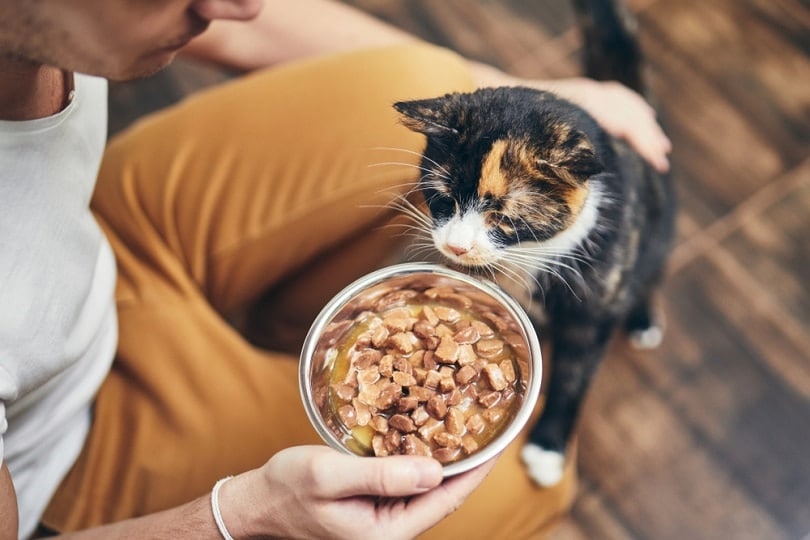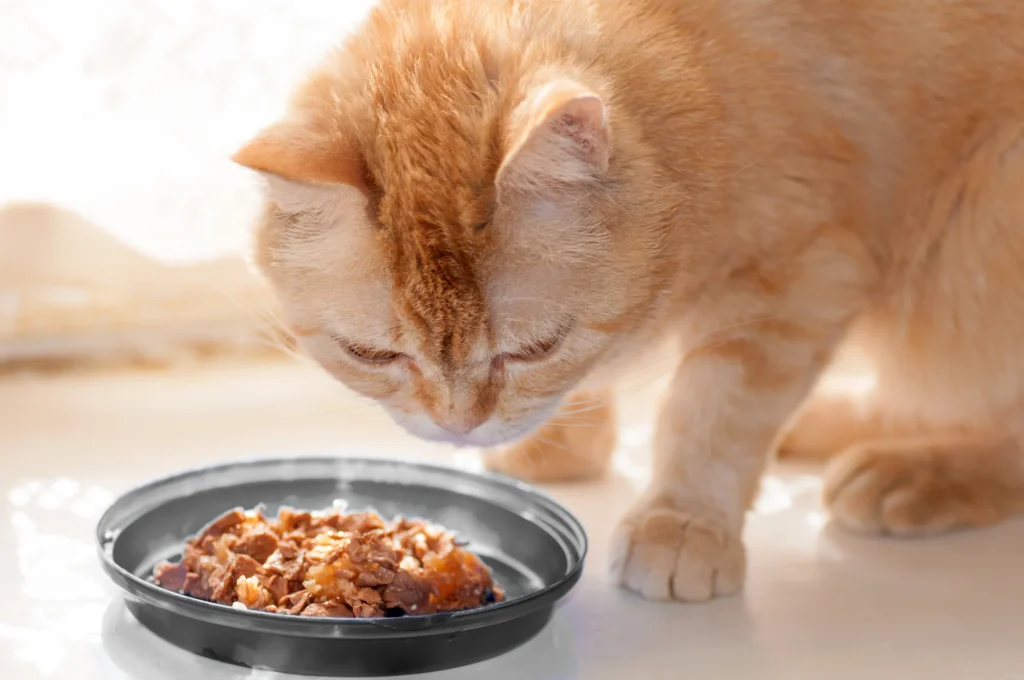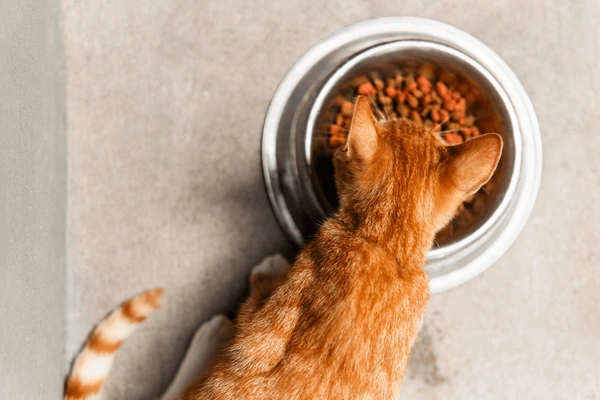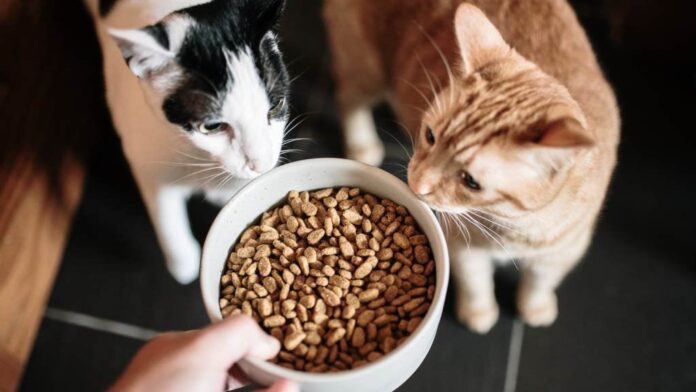Determining how often to feed cats and kittens isn’t straightforward. It depends on various factors, including age, health, household size, and the type of food you provide.
I Feed My Cat
Kittens, for instance, have unique nutritional needs and require frequent feedings. A stay-at-home caregiver can easily offer canned food multiple times a day, catering to the kittens’ needs for both growth and energy. In contrast, a busy single owner or a two-income family might prefer dry cat food for convenience, supplementing with canned food in the morning and at night.

For kittens under eight weeks, it’s ideal for them to stay with their mother. If that’s not possible, they may need to be bottle-fed until they can gradually transition to high-quality kitten food. By the time they reach six months, you can typically reduce feedings to twice daily.
For adult cats, feeding once or twice daily is standard, and they can thrive on either dry or wet food, depending on your schedule and preferences. Overall, it’s crucial to adjust feeding practices to ensure your cats receive the nutrition they need while considering your lifestyle and their individual requirements.
How Frequently Should You I Feed My Cat Kittens Canned Food?
Kittens have unique nutritional needs, requiring about twice the nutrients of adult cats to support their rapid growth and high energy levels. Their small stomachs can’t handle large portions, which is why they need frequent, smaller meals, similar to how human babies eat. It’s essential to monitor their weight regularly to ensure they are gaining appropriately without becoming overweight. Their hunger cues can serve as a good indicator of whether they are receiving enough nutrition.
Early Feeding Recommendations
For kittens under eight weeks, it’s generally best for them to stay with their mother. This natural arrangement provides them with the ideal nutrition and socialization. However, if the mother cat is unavailable, you can start bottle-feeding as early as two weeks old. At around five weeks, you can introduce a high-quality canned kitten food mixed with a kitten milk replacer (like KMR) to help ease the transition. It’s important to avoid giving kittens whole milk, as many cats are lactose intolerant and may have allergic reactions.

Feeding Schedule Breakdown
- At 6 Weeks Old: Kittens should be fed three or more small meals throughout the day. Spacing the feedings regularly helps establish a routine. It’s advisable to weigh the kitten weekly and maintain a record to track its growth and health progress.
- At 12 Weeks Old: By this age, you can begin to increase the portion sizes at each meal and gradually transition to three meals a day. This shift not only accommodates their growing appetite but also aligns with their developmental needs.
- Around 6 Months Old: At this stage, you can typically start to space out meals to twice daily. This adjustment helps adult cats become accustomed to a more standard feeding schedule, setting the foundation for their ongoing dietary habits.
Monitoring Health and Nutrition
During the early weeks of a kitten’s life, regular weight checks and careful observation of their eating habits are crucial. Use their hunger and energy levels as guidelines for assessing their nutritional needs. If a kitten appears excessively hungry or is not gaining weight properly, it may require adjustments to its feeding routine or a consultation with a veterinarian.
In summary, proper feeding practices for kittens involve frequent, small meals tailored to their developmental stage. Regular monitoring of weight and health, alongside a gradual transition to adult feeding schedules, will ensure your kittens grow into healthy, vibrant cats.
What About Dry Food?
Veterinarians indicate that dry cat food can adequately meet a cat’s nutritional needs, provided it is complete and balanced. Many cats thrive on a diet consisting solely of dry food and can lead long, healthy lives with it. For busy caregivers, a common approach is to feed adult cats canned food in the morning and evening while leaving dry food out for them to graze on throughout the day. This setup allows flexibility for those with hectic schedules.

Additionally, there are numerous premium dry cat food options available to cater to the diverse needs and preferences of different cats. Whether you have a finicky eater or a cat with specific dietary requirements, you can find a suitable option that supports their health and well-being.
Geriatric and Special Needs Cats
Older cats can typically maintain the same feeding schedule as adult cats, provided they haven’t developed any health issues that necessitate special dietary requirements. It’s crucial to consult your veterinarian for guidance on the appropriate feeding routine and food type for your senior cat. Following your vet’s recommendations ensures that your cat receives the necessary nutrition tailored to their specific needs. Regular check-ups can help identify any changes in health or dietary requirements as your cat ages, allowing for timely adjustments to their feeding plan. Keeping your senior cat on a consistent schedule can support their overall health and well-being, making sure they enjoy their meals while maintaining a balanced diet.
I Feed My Cat I Feed My Cat I Feed My Cat I Feed My Cat I Feed My Cat I Feed My Cat I Feed My Cat I Feed My Cat I Feed My Cat I Feed My Cat I Feed My Cat I Feed My Cat I Feed My Cat I Feed My Cat I Feed My
Cat I Feed My Cat I Feed My Cat I Feed My Cat I Feed My Cat I Feed My Cat I Feed My Cat I Feed My Cat I Feed My Older cats can typically maintain the same feeding schedule as adult cats, provided they haven’t developed any health issues that necessitate special dietary requirements. It’s crucial to consult your veterinarian for guidance on the appropriate feeding routine and food type for your senior cat.
Following your vet’s recommendations ensures that your cat receives the necessary nutrition tailored to their specific needs. Regular check-ups can help identify any changes in health or dietary requirements as your cat ages, allowing for timely adjustments to their feeding plan. Keeping your senior cat on a consistent schedule can support their overall health and well-being, making sure they enjoy their meals while maintaining a balanced diet.


